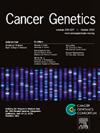HRD status variation in consecutive tumour biopsies in a pan-cancer cohort: a descriptive single-center study including patients from the Phase 1 Unit, Copenhagen University Hospital, Rigshospitalet
IF 2.1
4区 医学
Q4 GENETICS & HEREDITY
引用次数: 0
Abstract
Background
Limited data on the evolution of homologous recombination deficiency (HRD) status within the course of disease increases the risk of inaccuracies in deciding on Poly(ADP-ribose) polymerase inhibitor therapy and questions the necessity for confirmatory biopsies in clinical trials. This study aims to assess HRD status over time and its role as a dynamic biomarker.
Methods
Genomic tumour profiles obtained from cancer patients in a Phase 1 Unit were retrospectively analysed. Patients with >1 tumour tissue sample and available genomic tumour profiles were included. HRD scores were assessed according to the method described by Telli et al. (2016).
Results
A total of 108 patients were included across 24 cancer diagnoses. A potential therapy-altering shift in HRD status was observed in 17 patients: 12 went from negative to positive HRD status whilst 5 went from positive to negative.
Discussion
When testing for HRD, sensitivity to normal tissue in tumour samples has proven more consequential than previously expected. Based on our findings, HRD status rarely changes over time, and changes in HRD scores may not reflect a genuine biological shift. Therefore, patients considered for clinical trials based on historic HRD status may not need confirmatory biopsies after intervening treatment, thereby sparing patients from unnecessary procedures.
在一项泛癌症队列中,连续肿瘤活检的HRD状态变化:一项描述性单中心研究,包括来自Rigshospitalet哥本哈根大学医院i期病房的患者
背景:在疾病过程中同源重组缺陷(HRD)状态演变的有限数据增加了决定Poly(adp -核糖)聚合酶抑制剂治疗不准确的风险,并质疑在临床试验中进行确证性活检的必要性。本研究旨在评估HRD随时间的状态及其作为动态生物标志物的作用。方法回顾性分析1期临床癌症患者的基因组肿瘤谱。纳入了1份肿瘤组织样本和可用的肿瘤基因组图谱的患者。HRD评分根据Telli et al.(2016)描述的方法进行评估。结果24例肿瘤诊断共纳入108例患者。在17例患者中观察到HRD状态的潜在治疗改变:12例HRD状态从阴性变为阳性,5例HRD状态从阳性变为阴性。当HRD检测时,对肿瘤样本中正常组织的敏感性已被证明比先前预期的更为重要。根据我们的研究结果,HRD状态很少随时间变化,HRD评分的变化可能不能反映真正的生物学变化。因此,根据历史HRD状态考虑进行临床试验的患者在干预治疗后可能不需要确认性活检,从而使患者免于不必要的手术。
本文章由计算机程序翻译,如有差异,请以英文原文为准。
求助全文
约1分钟内获得全文
求助全文
来源期刊

Cancer Genetics
ONCOLOGY-GENETICS & HEREDITY
CiteScore
3.20
自引率
5.30%
发文量
167
审稿时长
27 days
期刊介绍:
The aim of Cancer Genetics is to publish high quality scientific papers on the cellular, genetic and molecular aspects of cancer, including cancer predisposition and clinical diagnostic applications. Specific areas of interest include descriptions of new chromosomal, molecular or epigenetic alterations in benign and malignant diseases; novel laboratory approaches for identification and characterization of chromosomal rearrangements or genomic alterations in cancer cells; correlation of genetic changes with pathology and clinical presentation; and the molecular genetics of cancer predisposition. To reach a basic science and clinical multidisciplinary audience, we welcome original full-length articles, reviews, meeting summaries, brief reports, and letters to the editor.
 求助内容:
求助内容: 应助结果提醒方式:
应助结果提醒方式:


